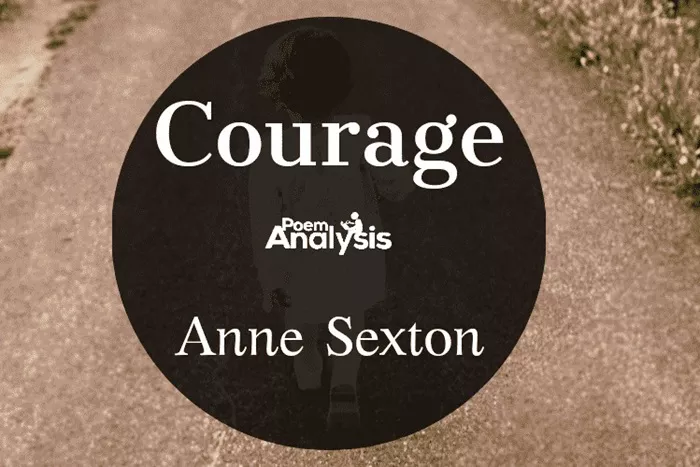Welcome to Poem of the Day – Courage by Anne Sexton
Anne Sexton was an American poet known for her raw and emotional work. She often wrote about personal struggles, mental illness, and the human condition. One of her powerful poems is titled “Courage.” In this poem, Sexton explores what it means to be brave throughout the different stages of life. The language is simple, but the meaning runs deep. Let’s take a closer look at this remarkable poem.
Courage Explanation
Overview of the Poem
“Courage” is a free verse poem. This means it does not follow a strict rhyme or meter. The poem is divided into four stanzas. Each stanza represents a stage of life:
-
Childhood
-
Young adulthood
-
Middle age
-
Old age and death
Sexton uses strong images and simple words to describe how courage shows itself in each part of life. The poem reminds us that bravery can be quiet. It does not always look like a grand or heroic act. Sometimes, it is simply surviving.
First Stanza: Childhood Bravery
The poem opens with a memory from childhood. Sexton writes:
“It is in the small things we see it.
The child’s first step,
as awesome as an earthquake.”
Here, Sexton shows that courage begins early. A baby’s first step is a big deal. It takes courage to move forward into the unknown. Even small things like learning to ride a bike or getting hurt and pretending not to cry take bravery.
Sexton writes:
“You drank their acid
and concealed it.”
This line speaks about emotional pain. As a child, we may feel hurt by others, but we often hide our feelings. That, too, is courage.
Second Stanza: Young Adult Courage
In the second stanza, Sexton turns to the courage of young adulthood. She writes about going to war, either real or symbolic. The lines suggest the pain of being wounded and still going on:
“You did not fondle the weakness inside you
though it was there. Your courage was a small coal
that you kept swallowing.”
This is one of the most powerful images in the poem. Courage is described as a burning coal—small but strong. You do not show it off, but you hold it inside and carry on. The coal is painful, but it gives you strength.
Third Stanza: Middle Age Strength
In middle age, courage takes a new form. Sexton writes about facing hard times such as poverty, sickness, and emotional loss. She says:
“You faced the snow and the carriage
without a sister,
and made the walk, brave and alone.”
These lines suggest that even when you are alone, you keep moving forward. Courage means continuing even when life is cold, dark, or lonely. It means getting through your pain with quiet strength.
Fourth Stanza: Facing Death
In the final stanza, Sexton talks about old age and death. She says:
“Later, if you faced the death of bombs and bullets
you did not do it with a banner,
you did it with only a hat to
cover your heart.”
The poem ends with the ultimate act of courage: facing death. Sexton writes that true courage is not loud. It is quiet, even gentle. At the end of life, you take your final breath with grace.
She ends with this line:
“Each spring will be a sword you’ll sharpen.”
This suggests that every new season of life gives you more strength. With each challenge, you grow braver.
Themes in the Poem
1. Quiet Bravery: Sexton teaches us that courage does not always shout. Sometimes, it whispers. It is found in daily acts of living, even when things are hard.
2. Growth Over Time: Courage changes shape as we grow older. From childhood to death, we face different kinds of fear. Sexton shows us how bravery follows us through life.
3. Pain and Resilience: The poem shows that life is full of pain, but we keep going. Courage means surviving heartbreak, war, loss, and even the fear of death.
Why This Poem Matters
“Courage” by Anne Sexton is a touching and honest poem. It helps us understand that bravery is not always a grand gesture. It can be something small and hidden. The poem speaks to anyone who has ever struggled, suffered, or simply kept going when things felt impossible.
Sexton’s simple words carry deep meaning. She reminds us that even if the world does not see our courage, it still matters.
Conclusion
Anne Sexton’s “Courage” is a timeless poem. It shows how bravery looks at different points in life. From the first steps of a child to the final steps before death, courage is with us. It may be quiet. It may be small. But it is always there. Through this poem, Sexton gives us a gift: the reminder that being brave does not mean being loud. It means never giving up.

